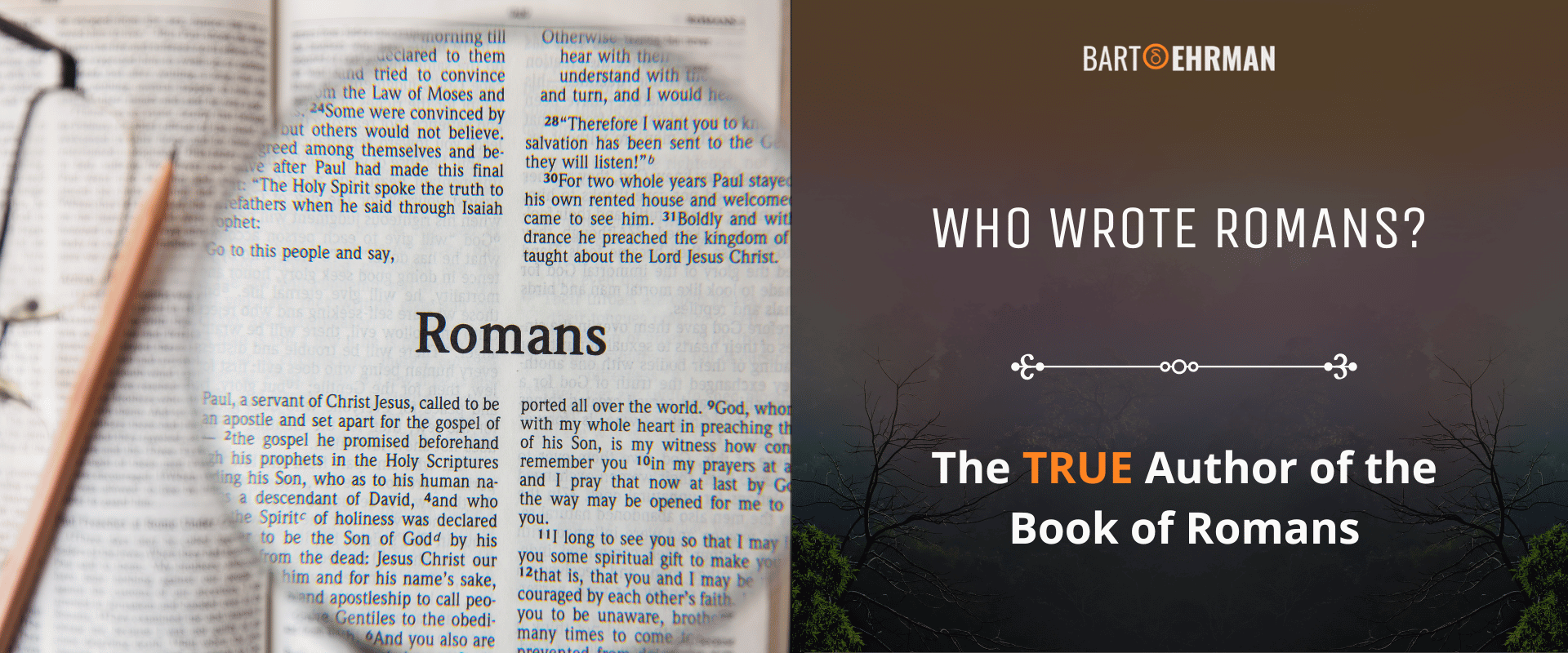Who Wrote Romans? (The TRUE Author of the Book of Romans)

Written by Marko Marina, Ph.D.
Author | Historian
Author | Historian | BE Contributor
Verified! See our guidelines
Verified! See our editorial guidelines
Date written: March 21st, 2024
Disclaimer: The views and opinions expressed in this article belong to the author and do not necessarily match my own. - Dr. Bart D. Ehrman
My journey into the depths of New Testament studies began with a dive into the original Koine Greek text of one of its most profound and pivotal works: The Epistle to the Romans.
During my post-graduate studies, the opportunity to explore this epistle in its original language unveiled its intricate themes and its unparalleled importance within the early Christian world. The experience was nothing short of revelatory, providing me with a firsthand appreciation for the richness of the text and its enduring significance through the centuries.
Yet, as I delved deeper, a fundamental question began to haunt my exploration: Who wrote Romans? This query isn’t merely academic; it touches the heart of understanding the text’s context and impact on early Christianity.
The authorship of Romans, traditionally attributed to Paul the Apostle in the very first verse, forms a cornerstone upon which the epistle’s authority and theological insights rest. But in a scholarly landscape where questions of authenticity and authorial intent loom large, can this attribution withstand rigorous scrutiny?
In this article, we embark on a journey through ancient texts and the landscape of doubt and debate surrounding them. We'll compare the themes and styles of Romans with those of Paul's undisputed letters, examine the historical context to see if the dating aligns with Paul's life, and finally, reveal the scholarly consensus on the authorship.
Through this exploration, we aim to uncover whether the Epistle to the Romans truly bears the hallmark of Paul’s theological and rhetorical mastery, or if the author was someone who deliberately forged the letter in Paul’s name.
Join me as we navigate the rich tapestry of historical, linguistic, and theological clues that promise to either confirm or challenge centuries of religious scholarship and belief.
The quest to answer the question, “Who wrote the Romans in the Bible?” invites us into a deeper engagement with one of Christianity's most influential texts.

Who Wrote Romans? Paul’s Claim to Authorship
In the intricate mosaic of early Christian literature, the Epistle to the Romans holds a place of distinction, not least for its opening assertion: “Paul, a servant of Christ Jesus, called to be an apostle and set apart for the gospel of God.” This declaration positions Paul, one of the greatest authorities in the early Church, as the unequivocal author.
Paul's contributions to Christian doctrine and his pivotal role in spreading the Gospel across the Mediterranean basin can’t be overstated. His authorship imbued the texts attributed to him with a profound sense of authority and authenticity.
The gravity of Paul's influence was such that his writings were not merely letters; they were foundational texts that shaped the very bedrock of early Christian theology and practice.
Yet, this claim of authorship propels us into the heart of a broader scholarly debate, magnifying the inquiry, "Who wrote Romans?". This question doesn’t exist in a vacuum but emerges from a landscape where the authenticity of sacred texts is scrutinized against a backdrop of widespread forgeries.
As it turns out, early Christian literature is marked by a notable phenomenon: the prevalence of pseudonymous works—texts attributed to key figures within the faith, whose actual origins lie elsewhere.
Bart D. Ehrman starkly observes, "Arguably the most distinctive feature of early Christian literature is the degree to which it was forged." This observation is further echoed by David Brakke, who notes that "of the twenty-seven writings that make up the Christian New Testament, at least ten are almost certainly forgeries - writings whose authors falsely claim to be someone else."
This pervasive practice of pseudonymous writing casts a shadow of doubt over the authenticity of early Christian texts, including those attributed to figures of immense authority like Paul.
In this context, the claim of Pauline authorship in Romans confronts us with a pivotal question: amidst a sea of forgeries and disputed texts, how can we discern the authenticity of Romans as a genuine letter from Paul?
As we navigate the complexities surrounding the authorship of the Book of Romans, our first step is to delve into the epistle itself, presenting the summary of its themes and content. This examination will not only showcase the profound theological insights of Romans but also enable us to draw parallels with the themes and writing style found in Paul’s undisputed letters.
Who Wrote the Book of Romans: Clues from Its Summary and Key Themes
In the Epistle to the Romans, we are presented with a rich and complex tapestry of theological insights, woven together to address fundamental questions of faith, salvation, and the role of the law. Central to this narrative is an exploration of how individuals, both Jew and Gentile, can achieve righteousness and thus stand justified before God.
This quest for understanding is meticulously anchored in the Jewish Scriptures, proposing a message of universal salvation accessible through faith in Jesus Christ. Bart D. Ehrman encapsulates the essence of Romans, noting it as an extended argument that the author’s Gospel of salvation—his message of how a person, Jew or Gentile, comes into a right standing before God—derives from the Jewish Scripture.
In other words, the author of Romans builds up the whole theology of salvation upon the argument that a person is justified by faith apart from the works of the law. This is one of the key insights into the “Who wrote Romans?” question.
As it turns out, the emphasis on justification through faith rather than adherence to the law is the cornerstone of Pauline theology which echoes across his undisputed letters, particularly in Galatians and Philippians.
Did You Know?
The Apostle Paul often relied on the assistance of a secretary, or amanuensis, to compose his epistles. This intriguing aspect of ancient correspondence is subtly revealed in Paul’s letter to the Galatians.
In a personal note, Paul takes the pen himself to write, “See what large letters I use as I write to you with my own hand!” (6:11). This remark gives us a rare glimpse into the collaborative process between Paul and his secretaries. For those interested in exploring the relationship between Paul and his scribes E. Randolph Richards' study, "Paul and First-Century Letter Writing", is a must-read!In these texts, Paul consistently argues against the notion that observance of the law could ever suffice for salvation, instead championing faith in Christ as the true path to righteousness. This thematic resonance suggests a shared authorial perspective, hinting at a common voice behind these epistles.
Moreover, The Book of Romans unfolds a vision of a community unified in belief, transcending ethnic boundaries to include all who embrace faith in Christ. This vision of inclusivity and unity is a recurring motif in Paul's letters, where he frequently addresses the dynamics of Jewish and Gentile relations within the early Christian communities.
His Epistle to the Corinthians, for instance, reflects a similar concern for overcoming theological but also social divisions and fostering a sense of belonging and shared purpose among believers, underscoring the universal applicability of the gospel message.
Furthermore, stylistic and rhetorical analysis reveals parallels between Romans and Paul's other writings. The use of diatribes, rhetorical questions, and the careful structuring of arguments to engage and persuade the reader are hallmarks of Paul's epistolary style.
These techniques, employed extensively in Romans, serve to both articulate complex theological concepts and foster a sense of dialogue with the audience. This similarity in style and substance reinforces the connection between Romans and the broader corpus of Pauline literature, suggesting a common authorial hand.
As we weave together the thematic and stylistic strands of Romans with those found in the undisputed letters of Paul, a compelling picture begins to emerge.
The deep resonance in themes of faith, justification, and the transformative power of Christ's salvation, coupled with a signature rhetorical style marked by persuasive argumentation and engaging dialogue, hints at a familiar authorial presence.
The journey toward a definitive conclusion regarding the authorship of the Book of Romans is far from complete. Our next step involves meticulously dating the epistle, placing it within the broader tapestry of historical events and Paul's known missionary journeys. This phase is crucial, as it will enable us to determine whether the timeline of Romans aligns with the life and activities of Paul.
Dating the Book of Romans? Another Clue in the Quest for Authorship
In the quest to date ancient texts, scholars adopt a meticulous approach that combines internal clues with external validations. Internal evidence within the document itself can include specific mentions of dates, events, or figures that have external corroboration, alongside linguistic and thematic elements that resonate with certain historical periods.
External attestation further strengthens this timeline by incorporating references from later authors who had access to the document or from historical records that acknowledge the text or its contents. This dual approach weaves a detailed picture that aids in accurately dating ancient writings.
When applying this methodology to the Book of Romans, we uncover insightful conclusions. According to New Testament scholar James D. G. Dunn, the letter is estimated to have been written: "sometime in the 50s A.D., probably in the middle 50s, and most probably late 55/early 56, or late 56/early 57."
This timeframe not only situates Romans in the mid-first century but also corresponds with the active period of Paul's life, particularly his missionary journeys and theological discourses.
Further clarity on the dating and origin of Romans is provided by Robert Jewett's commentary, which posits a broad consensus among scholars that Paul dictated the letter from Corinth or its vicinity. This was done in the period just before his final trip to Jerusalem, aimed at delivering the collection from the Gentile churches.
This specific context not only confirms the dating provided by Dunn but also situates the letter within a well-documented phase of Paul's ministry, enhancing the historical plausibility of Pauline's authorship.
This intersection of similar themes and style, common internal evidence, external attestation, and scholarly consensus brings us closer to resolving the question of "Who wrote Romans?" With the dating of the epistle aligning so closely with Paul's documented life and activities, the scales tilt further towards affirming Paul as the true author.
This period of composition, deeply intertwined with Paul's missionary work and theological engagement, offers a convincing backdrop to the profound explorations within Romans.
As we peel back the layers of history, the mystery of authorship gradually unfolds, suggesting that Paul's voice indeed shapes the theological richness of this pivotal epistle.
With the context of Paul's life and the timing of Romans becoming clearer, it naturally leads us to inquire further into the audience of this profound work. Who was the Book of Romans written to?
This question beckons us into the next phase of our exploration, as understanding the intended recipients of the epistle will shed additional light on its purpose, themes, and the circumstances surrounding its creation.
Who Was Romans Written To? Understanding the Original Audience
The Book of Romans was written to the early Christian community residing in Rome, the epicenter of the Roman Empire. This diverse congregation comprised both Jewish and Gentile believers, navigating the complexities of faith amidst the backdrop of a predominantly pagan society.
Through this epistle, Paul endeavored to address the theological queries and communal challenges confronting this nascent group, aiming to cultivate unity and a shared comprehension of their faith.
The inception of Christianity in the capital city is notably marked by the events surrounding the “edict of Claudius” as documented in Acts 18:2, casting a spotlight on urban Roman Christianity's historical emergence. This juncture allows historians to draw several critical conclusions:
By the time Paul addressed his letter to the Romans in the mid to late 50s C.E., the Christian community in Rome was already well-established, though still in the throes of defining its identity against a backdrop of diverse beliefs and practices.
In weaving the narrative of Christianity's early days in Rome with the broader theological discourse, the Book of Romans stands as both a doctrinal cornerstone and a historical testament to the Christian community's early efforts to find unity amidst the grandeur and complexity of the Roman Empire.

Summing up Conclusion
In summing up our exploration into the authorship of the Epistle to the Romans, the evidence points compellingly towards Paul the Apostle. The question of "Who wrote Romans?" doesn’t merely serve an academic curiosity but also significantly contributes to our understanding of early Christian literature's formation and dissemination.
Through a detailed examination of internal textual evidence and substantial external attestation, including early Christian writings and lists like the Muratorian Fragment, scholars have reached a consensus on Paul's authorship.
Paul's letters, particularly Romans, are pivotal for understanding the evolution of Christian thought, especially concerning topics like salvation, the role of the law, and the inclusion of Gentiles into what was initially a Jewish sect on its way to becoming a new, distinct religion.
Finally, the affirmation of Paul's authorship based on historical-critical methods allows us to appreciate the Epistle to the Romans as a product of its time, reflecting the theological and social issues of the early Christian community.
For those who are intrigued by early Christian topics and seek a deeper understanding of the Gospels, Dr. Bart D. Ehrman's online course "Unknown Gospels" offers a unique opportunity. Dive deeper into the fascinating world of biblical scholarship with this course, embarking on a scholarly journey to differentiate between myth, legend, and history in the Gospels as historical sources. Enroll now and uncover the hidden stories behind the well-known narratives.
